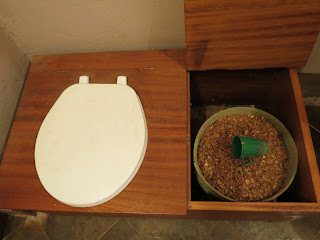Many parts of life in Mozambique differ greatly from the
lives of our friends and family in the US.
From strange foods, to odd customs, to the challenge of juggling
multiple languages, we end up having plenty to share about as we try to explain
just what exactly we do over here. But
when we talk about daily life in Africa the thing that provokes the most
grimaces from listeners is the fact that we do not have a flush toilet.
Our family is using composting
toilets...which is just a nice way of saying that we go to the bathroom in a
bucket.
The main reasons why we decided to do this were that we had
experienced severe water shortages, and that I was tired of dealing with
Mozambican plumbing parts. They
constantly leak and break, and in our last rental house especially the plumbing
system was so poorly designed that it always smelled bad. So, when we built this house we decided to go
with composting toilets. Our friends,
the Caldwells and Holtons had used this method for years in another part of
Mozambique so that made the concept a little easier to implement.
So how does this actually work? Well, I will try not to be
crass with my descriptions... I know how quickly this post could start to go
down the...bucket (?). In our bathroom,
we keep a bucket of sawdust nearby (teak shavings from the local sawmill,
typically) and anytime someone makes a deposit in the bucket, they scoop up
some sawdust and cover it up. The
sawdust soaks up all the moisture and the lack of moisture knocks down the smell.
It is then my job every week to take the buckets outside and dispose of the
contents. I empty the buckets into a little
fenced-in compost pile, I cover everything up with leaves, dirt or more sawdust. After the waste has sat for a full year it becomes
ready-to-use compost.
It was brought to my attention recently that I had hurt a friend's
feelings, so a plan was made to sit down and talk it out. It took some time between realizing the need
to work it out and actually making the meeting happen, and I was nervous. I dreaded the uncomfortable pauses in
conversation, and part of me wished we could just leave things be. But ultimately I had confidence that we would
be able to clear everything up, I just knew we would have to deal with the mess
first.
It just so happened that both my composting duties and this
conversation happened on the same day.
So, in the morning while I was taking out our family's
buckets I reflected on the fact that later that day we would be taking out the
buckets in that relationship. It is not
always pleasant work but it must be done.
In his book, Life Together, Bonhoeffer writes that, “The
brother is a burden to the Christian, precisely because he is a Christian. For
the...(non-Christian who is not interested in life in community) the other
person never becomes a burden at all... (because) he simply sidesteps every burden that
others may impose upon him."
There is a cost to living in community.
It requires vulnerability.
It requires trust.
But most of all it requires a willingness by everyone
involved to get their hands dirty - a willingness to bear each others burdens.
Rachel and I have felt that being a part of a mission team - a community
that lives, works and prays together - has brought us both some of the greatest
blessings and some of the hardest challenges over the last decade or so.
I am thankful to be a part of a group that is willing to
take out the buckets with me, willing to do the hard work of being a community
- the hard work of truly being the church.
Grace and Peace,
Alan
